For the psychologist, punishment “can negatively influence emotional development”
Summary
According to psychologist Fernanda Fuso, disciplinary punishments can negatively affect the emotional development of young children. She recommends that parents view discipline as a time for teaching, rather than punishing.
The punishment that Virginia Fonseca inflicted on her eldest daughter, 2-year-old Maria Alice, has raised debate about the impact of punishment on young children, as the influencer is followed by 46.5 million people on Instagram alone. The eldest pushed her 1-year-old sister Maria Flor twice because her youngest would have to swim before her. Therefore her mother prohibited Maria Alice from playing in the swimming pool.
To the Earthchild and adolescent psychologist Fernanda Fuso argues that the practice of punishment is not recommended, since at this age the ability to understand concepts related to morality is limited and children are still forming the foundation of how to interact with others.
Punishment can affect emotional development
The psychologist specializing in parental care explains that punishment, especially if isolated and without an understandable explanation, is not effective. “The child may not associate the punishment with the specific behavior that led to that consequence. Additionally, he may feel rejected or misunderstood, which can negatively affect her emotional development.”
At this stage of life, children learn about trust, safety, and how to manage what they feel. When punishment is administered without adequate explanation or a clear connection to the behavior, the child may feel confused. “This can lead to self-esteem issues and difficulties in social relationships, as the child may begin to see the world as a threatening place,” she explains.
-1jy889c6ht0s5.png)
Virginia and Zé Felipe will have a boy! Details of the presentation party for the couple’s third child
Teaching opportunities
The psychologist recommends using these moments as teaching opportunities, “explaining simply and clearly why the behavior is inappropriate”. The idea is to help the child understand the emotions involved in the conflict and understand the importance of treating others with respect and care.
Parents are also affected by the punishment
Virginia said she was sorry for having punished Maria Alice. “I hate it, because the punishment hurts us more than the child, right? How disgusting, it’s worse for us mothers than for them. But it’s part of the whole thing, he doesn’t know how to deal with her emotions and I think it’s a process and a challenge,” the influencer said on her social media.
Psychologist Fernanda Fuso explains that, in addition to the direct effects on children, punishments actually have an impact on parents. “First, it can be emotionally difficult for parents to administer discipline consistently, which can lead to feelings of guilt or doubt about their parenting abilities. Additionally, if punishment does not result in a change in behavior, it can lead to frustrating cycle of more punishment and potential tension in the parent-child relationship.”

Guide, don’t punish
According to the expert, parents should focus “on teaching and guidance, rather than punishment.” The measure helps to strengthen the relationship between parents and children. “Methods such as talking about the behavior, explaining the consequences of their actions in a way they can understand, and encouraging empathy and repair (such as apologizing or helping to correct a mistake) are much more effective for developing social skills and emotional health in children. young people,” he says.
Convenience and resolution
Adult intervention can be crucial in helping children learn to manage their feelings constructively. For example, it is important to teach children to wait their turn. “This helps develop patience and respect for others,” explains the psychologist.
It is very important to make it clear that children have a place to seek comfort when they are sad. A practical example is to tell the child that if he is sad she can come and hug him, so together they will find a solution.
If the conflict is resolved, it is recommended to positively reinforce the child’s ability to solve the problem. “When children manage to resolve their conflicts or manage their emotions in a positive way, they should be praised. This reinforces the desired behavior and encourages them to repeat it in the future,” says the psychologist.
Source: Terra
Ben Stock is a lifestyle journalist and author at Gossipify. He writes about topics such as health, wellness, travel, food and home decor. He provides practical advice and inspiration to improve well-being, keeps readers up to date with latest lifestyle news and trends, known for his engaging writing style, in-depth analysis and unique perspectives.








